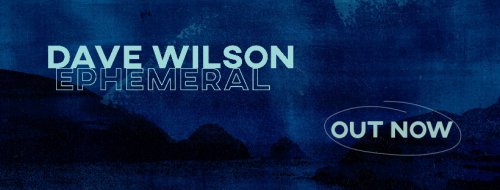Music News - Dave Wilson Collaborates With Local Talents to Bring New Album 'Ephemeral'

01 December 2023 - 0 Comments
Ephemeral is the latest release from Aotearoa New Zealand-based artist Dave Wilson, featuring Wilson on tenor saxophone and bass clarinet in an improvising ensemble including trumpet, guitar, bass, drums, and string quartet.
With multi-layered grooves and intricate textures, Wilson creates musical worlds that foreground the wide-ranging musicalities of his collaborators and amplify the many dimensions of his playing. The album’s nine tracks take listeners down a path that explores ephemerality of all kinds, guided by alternatively floating and driving improvisatory melodies and rhythmic impulses of Wilson and the ensemble.
In the themes that it approaches, Ephemeral is not simply about transience, it is about how we as humans are – only briefly – interconnected with one another and with other elements of the world. Along those lines, each of the album’s compositions explores relationships of some kind, and how they give meaning to and are expressed in sounds, spaces, and places.
The album opens with Speak To Me of Yesterday and Tomorrow (Elusive As The Dead), a piece inspired by a riroriro (grey warbler) whose song has long been present in Wilson’s space in Te Whanganui-a-Tara (Wellington), New Zealand’s capital where he lives. The piece alternates between a bouncing strut and a driving repeating cycle, first for a set of swirling melodies, and then a saxophone solo from Wilson that is boosted into the stratosphere by the improvising string quartet and the rhythm section. Trumpeter Ben Hunt continues with his own beautifully constructed solo, uplifted by the strings, before the group’s return to the melodies and a tuneful display on the drums and cymbals by Hikurangi Schaverien-Kaa. In many ways the piece establishes Wilson’s approach throughout the album – the group flexibly improvises together both collectively as a unit and in modalities that bring out the best in every soloist.
The opening of What Shines Is A Thought That Lost Its Way brings violinist Amy Brookman of the New Zealand Symphony Orchestra (NZSO) to the front, interweaving her vibrant lyricism with the gentle pulsing of the ensemble. The disjointed-but-connected flowing lines of the musicians in the middle section most strongly evoke the concept of the piece – a link between the Aurora Borealis and the breakdown of human relationships that once held great promise. The closing brings out one of the album’s most head-bobbing grooves, along with some shredding on the violin by Brookmanas Wilson’s saxophone eggs her on.
The next two tracks on the album shift the mood, first to a drone-based meditation featuring Wilson on bass clarinet and the emotive timbres of the string quartet and bass (For Olivia), and then to Liv’s Theme, where a simple repeating figure in the bass, along with the gently persistent bass clarinet, generates extended collective improvisations from both the strings and from the guitar (Callum Allardice) and trumpet (Hunt).
“My niece, when she was two years old, inspired this composition through a song she was singing to herself one day,” Wilson says. “She soon forgot the tune, but I asked her parents (my sister and her husband) if I could elaborate it into a longer composition, which became the bass line in Liv’s Theme. It's become a special point of connection for us.”
The bass solo by Chris Beernink at the end of the track, permeated with the nostalgic sparkle of the strings, encapsulates some of the melancholy that lies behind the innocence and fleeting nature of childhood.
A Hundred Glowing Clouds finds even more avenues for Wilson on bass clarinet, with its plodding molasses groove bringing the trumpet (Hunt) and violin (Brookman) together in a tribute to the passing of Wilson’s grandmother in the form of a sunset. In High Maintenance, the violin, viola (Nicholas Hancox, NZSO), saxophone, and trumpet frantically surf on top of a seemingly unrelated swing feel before the ensemble converges. Schaverien-Kaa drives the group on Lift, pushing and pulling the string quartet (which also includes violinist Monique Lapins of the New Zealand String Quartet and cellist Bennie Sneyd-Utting) and the rest of the group. On Dissipation, Ben Hunt shines with the strings, who also set the course for the duo of Allardice and Wilson (on saxophone) on perhaps the happiest of the album’s grooves.
The album closes with Keep It To Yourself, which Wilson wrote in the context of his work as a researcher and musician in North Macedonia and originally released on the album On the Face Place by CSPS Ensemble, Wilson’s group with some of North Macedonia’s leading musicians. On this new version, the strings add a new bite and brightness, and Bennie Sneyd-Utting’s cello playing takes the piece – and the ensemble – into a thrilling new universe.

Most Viewed Artists
Latest Galleries
NZ Top 10 Singles
- APT.
ROSÉ And Bruno Mars - DIE WITH A SMILE
Lady Gaga And Bruno Mars - BIRDS OF A FEATHER
Billie Eilish - TASTE
Sabrina Carpenter - I LOVE YOU, I'M SORRY
Gracie Abrams - ESPRESSO
Sabrina Carpenter - SAILOR SONG
Gigi Perez - LOSE CONTROL
Teddy Swims - A BAR SONG (TIPSY)
Shaboozey - GOOD LUCK, BABE!
Chappell Roan








 Report A Problem
Report A Problem


There are currently no comments for this article. Please log in to add new comments.